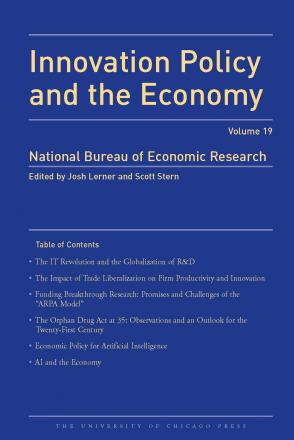Innovation Policy and the Economy, Volume 19
Josh Lerner and Scott Stern, editors
This volume focuses on the interaction between public policy and innovation. The first chapter documents the dramatic globalization of R&D and how this development has affected the efforts of U.S. multinationals to operate on the global technology frontier. The next chapter synthesizes research on the impact of trade shocks on innovation and explains how these shocks' effects depend on the firms, industries, and countries affected. The third chapter examines the Advanced Research Projects Agency (ARPA) model of research management — an approach to funding and managing high-risk R&D — and offers a method for diagnosing which research efforts are "ARPA-able." Next is a study of the Orphan Drug Act and the key changes in the U.S. healthcare landscape and in drug discovery and development since passage of the act in 1983. The last two chapters focus on artificial intelligence (AI). One describes how AI diffuses through the economy and discusses implications for economic inequality, antitrust concerns, and intellectual property rights. The other investigates issues surrounding firm competition and labor force participation, such as data portability and Universal Basic Income, and evaluates ways to address these issues.



